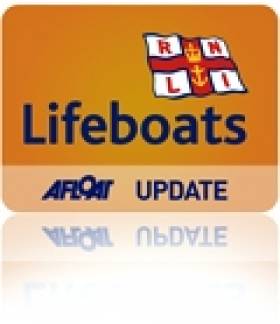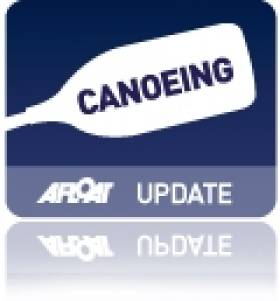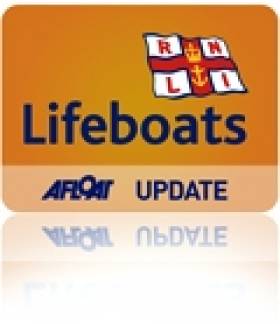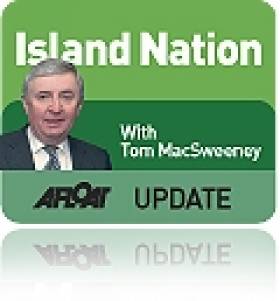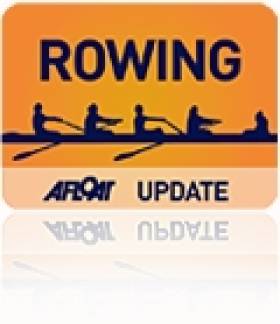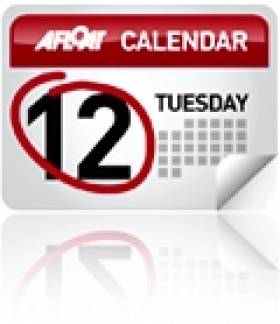Displaying items by tag: Charity
Donation for Bangor Lifeboat Crew
RNLI Bangor's volunteer lifeboat search and rescue crew were pleased to receive a donation of £500 from the Bangor Marina Berth Holders Association this week.
Association chairman Martin Wilson said: "Every year our members raise funds for various local nautical charities and this year we decided that the RNLI Lifeboat at Bangor would be one of our worthy causes."
Bangor RNLI operations manager Kevin Byers said that the RNLI "is always grateful to receive funds, being a charity we are totally reliant on suchdonations. It allows us to provide 24-hour emergency cover and to continueto save lives at sea."
He added: "I would like to thank the Bangor Berth Holders Association for their support."
Shooter Passes Dublin on Solo Kayak Challenge
laine 'Shooter' Alexander has already passed Dublin in her challenge to circumnavigate Ireland by kayak.
Just 10 days into her solo voyage to raise funds for charity and Elaine has already reached Greystones in Co Wicklow.
But she still has a long way to go to complete the 1,000-mile route battling tides, headlands, cliffs and unpredicatable weather.
See below for a map showing Shooter's current position.
Simon Coveney Appointed Marine Minister
Cork sailor Simon Coveney (38) has been appointed as Minister of Agriculture, Food and Marine in the new cabinet of the Fine Gael/Labour Government formed yesterday.
The announcement has been welcomed by various marine interests pleased to see Marine back at the cabinet for the first time since the Department was dismantled by Fianna Fail's Bertie Ahern in 2002.
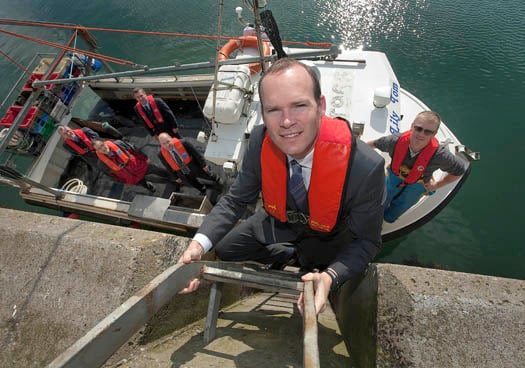
Marine Minister Simon Coveney TD
The appointment means Taoiseach Enda Kenny has kept good an election promise to reinstate the Marine department. A decade of lost opportunties has meant the sector has suffered through lack of infrastructure and coastline planning.
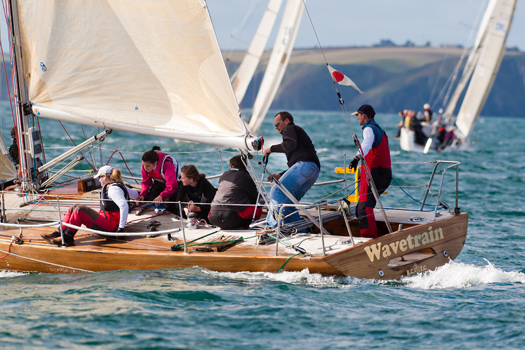
Simon Coveney at the helm of his yacht Wavetrain. Photo: Bob Bateman
"Simon is someone who understands the Sea as a sailor himself but also in his work as an MEP where he was involved in a number of major European maritime projects. This is a great opportuinty for the Marine. We look forward to working with him to develop this untapped resource." said David O'Brien of the Irish Marine Federation.
Simon was first elected to the Dáil in 1998 as one of Fine Gael's youngest TD's aged 26. He replaced his father Hugh Coveney TD following his untimely death.
Simon follows his father in to the post of Marine Minister. Hugh held the post in 1994.
Simon holds a B.Sc. in Agriculture and Land Management from Royal Agriculture College, Gloucestershire. He was also educated at Clongowes Wood College, County Kildare; University College Cork, and Gurteen Agricultural College, County Tipperary.
A keen fan of all competitive sport he has worked as a sailing instructor at his club Royal Cork Yacht Club in Crosshaven and been involved in many sailing regattas.
In 1997/8 he led the "Sail Chernobyl Project" which involved sailing a boat 30,000 miles around the world and raising €650,000 for charity.
In 2006 he contributed to RTE's series The Harbour and in a memorable quote, the Cork TD and former MEP said: "When somebody asks me the question, what's the one thing that's special about Cork?, I'd say the harbour."
Dramatic Photos of Clifden Lifeboat Battling Surf
John organised the training in response to the increased popularity of the area with surfers. RNLI Divisional Assessor Trainer Helena Duggan travelled to the lifeboat station to put 18 volunteer lifeboat crew through their paces and train them in handling the lifeboat in surf and responding to potential callouts from leisure marine enthusiasts.
Training is a core part of volunteering with the RNLI and each crewmember in Clifden trains once a fortnight on the stations two inshore lifeboats.
Commenting on the exercise John said, "I took my camera down to photograph the exercise and was really pleased with the results. It is great to be able to show the public what our lifeboat volunteers go through to ensure they are fit and trained to go to sea. We had a fantastic turnout on the day and the lifeboat crew learned about boat handling in surf conditions. We are delighted so many people are visiting the area for leisure marine activities."
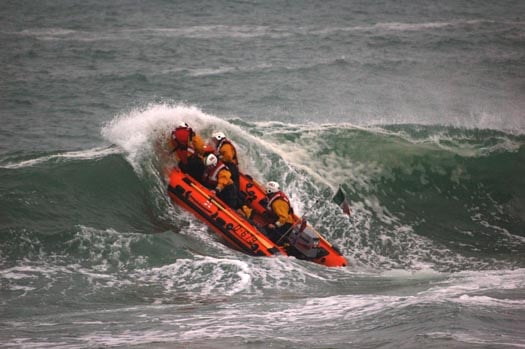
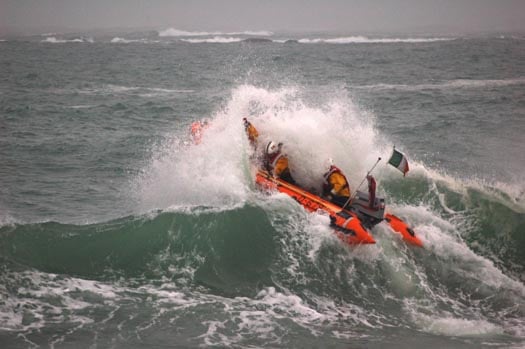
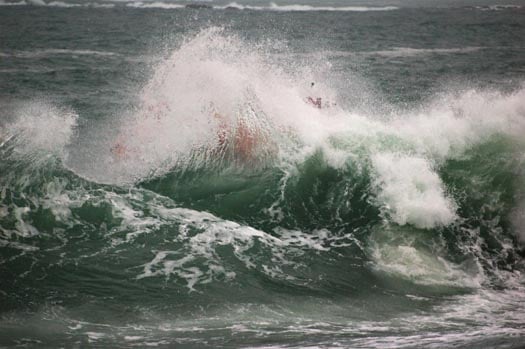
Photos by John Brittain/Clifden RNLI show Clifden volunteer lifeboat crew with RNLI Training assessor Helena Duggan during surf training on Dunloughan beach, Ballyconeely
Related Safety posts
RNLI Lifeboats in Ireland
Safety News
Rescue News from RNLI Lifeboats in Ireland
Coast Guard News from Ireland
Water Safety News from Ireland
Marine Casualty Investigation Board News
Marine Warnings
The auction will run from the 7th – 16th January, with 100% of the proceeds going to the Ellen MacArthur Cancer Trust. The charity, founded by Ellen in 2003, takes young people aged between 8-24 sailing to help them regain their confidence on their way to recovery from cancer, leukemia and other serious illness.
The exclusive items which incorporate parts of the original sail's of Ellen MacArthur's record breaking Open 60 yacht Kingfisher are only available through the auction. Ellen famously completed the epic 24,000 mile Vendée Globe, a gruelling non-stop, solo round the world race, in 94 days and 4 hours in 2001 onboard Kingfisher, securing her place in the record books as the youngest person to complete the race, at just 24 years old.
A further five jackets and twenty bags will be available for purchase from the beginning of February, with proceeds from the sale of these items continuing to support the Ellen MacArthur Cancer Trust.
Each jacket and bag is hand made, individually numbered and signed by Dame Ellen MacArthur. Ellen commented, ""The Vendee Globe was a dream for me, and my first circumnavigation of the planet. It's wonderful to think that 10 years on that incredible journey can continue to influence lives, though this time through the Ellen MacArthur Cancer Trust. It costs the Trust £500 to take one young person in recovery from cancer sailing on a four day yacht trip, but the result of that experience for those young people is not only confidence building, but in many cases life changing. We are therefore really excited to be working alongside Quba Sails on this project!"
James Marshall at Quba Sail's explains why they are proud to be supporting the Ellen MacArthur Cancer Trust. "At Quba we specialise in taking old sailcloth and giving it a new lease of life. To be working with Ellen on this project and to be able to help a charity as worthy as the Trust just seemed like a perfect fit for us. We hope we can raise some impressive funds for the Trust through the auction".
The range will be available for viewing on the Quba Sail stand at The Tullett Prebon London Boat Show.
To place your bid, please visit the auction on Ebay. http://tinyurl.com/quba-emct-e-bay-auction
An Irish Maritime Foundation
I wonder whether there might be interest in forming an Irish Maritime Foundation?
I raise the question having discussed the possibility with those who run the UK Maritime Foundation and whose views about the sea about the sea impressed me when I met them in London. The Foundation traces its history back to 1981 when shipowners, senior retired naval officers and people involved in the financial industry reacted to changes in British Government policy that were regarded as failing to protect the importance of the UK maritime industry. It is a registered charity with the purpose of promoting and raising interest in the maritime sector amongst the public, the media and Parliament. To do so it is involved in assisting development of maritime education, training and research.
The British are a magnanimous people in my view. It was an honour to accept the Desmond Wettern Award from the Foundation. Desmond Wettern was a distinguished UK maritime journalist for over 30 years and the awards were established in his name. This year the Society for Nautical Research joined the awards project.
In responding I used one of my favourite descriptions - "the Family of the Sea," which I have used on radio. It drew a lot of interest from those present. I believe there is a "family of the sea" which spans oceans and seas, linking those who appreciate the sea as essential to human survival.
"Everyone who has an interest in the sea would recognise that there are and will continue to be, increasing pressures on its use and on the exploitation of its finite resources, but also a number of opportunities," according to Rear Admiral Christopher Perry, Chairman of the UK Marine Management Organisation. Those views and others I discussed with some of those amongst the 200 attending the function, who came from various parts of the world. Professor Richard Harding of the Society for Nautical Research which is marking its centenary, expressed this opinion: "There is a disturbing sense of sea-blindness in the British Government, amongst the general public at large and in the media."
There is certainly sea-blindness in our Government and in much of the media, though I am hopeful that there is growing awareness of the importance of the marine sector amongst the general public. If Ireland had an organisation like the Maritime Foundation, I would be very pleased.
• This article is reprinted by permission of the EVENING ECHO newspaper, Cork, where Tom MacSweeney writes maritime columns twice weekly. Evening Echo website: www.eecho.ie
Charity Rowers Row for Africa
Transatlantic rower Sean McGowan will join two of Inishowen's best known charity workers - whose ages total 153 years - in a sponsored 25-mile row this weekend in aid of Self Help Africa.
Albert Doherty (68) and Willie Harrigan (85) will be joined by rowers from clubs in Glenarm in Co. Antrim and Arklow. Also taking part will be Sean McGowan who last year rowed solo across the Atlantic in 188 days.
The row from Prehen Boat Club in Derry to Moville will take place on Saturday 26th June with the "winner" the person with the most money raised on their sponsorship card, receiving a trophy in memory of the late Betty Nicell from Derry.
This will be the fifth time Albert and Willie will row the Foyle in aid of Self Help Africa and this year will see them undertake the trip in a boat personally restored by Albert.
To date Albert's fundraising has totalled approximately €28,000 - an achievement recognised last year by President Mary McAleese.
Anyone wishing to take part or make donations can do so by contacting Albert on 074 93 83360.
Click this link for the Latest Rowing News
Boat of Hope Seeks Sunday Volunteers
The Variety Club of Ireland is planning to share a special boating experience with children who have special needs, and to raise funds for their comfort and benefit.
The day begins with their special young guests, dressed as mini-pirates, departing from Howth Marina for a private adventure on the high seas! This charity event is being held in Ireland for the first time and will allow about 80 families enjoy an afternoon of fun with their special needs children. Generous boat owners and crew from Howth, Malahide and Dun Laoghaire have offered to take these special crews for a short trip out of the harbour as part of a fun-filled day which includes activities ashore on the green on Harbour Road.
We would like to encourage as many members as possible to get involved this Sunday by joining the 'Pirate Armada' and dressing their boats overall as well as enlisting as volunteers to help assist the families on and off the many motorboats and yachts that have been generously offered to help host this huge event.
Following a skipper's briefing, the 'Armada' will begin to depart the marina at about 12:00 on Sunday to return about 45 minutes later. 'Pirate' attire is the dress code for all participants, volunteers and observers and the weapon of choice should be waterpistols!
Details HERE


























